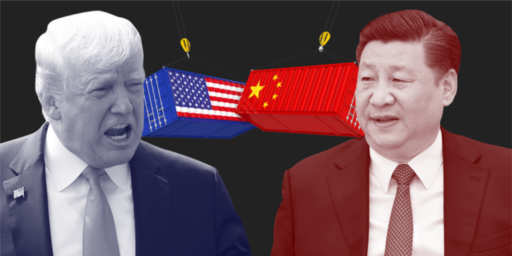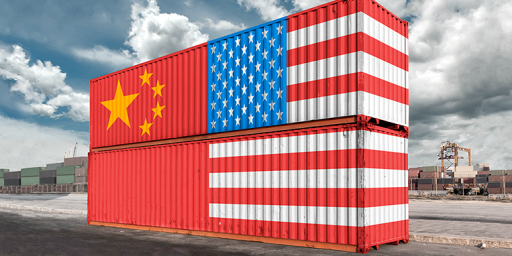The Reputation Effect
One of the things about people who seem biased against markets is that they seem to ignore the effect reputations can have on helping to ensure that markets work. If a firm builds up a reputation that is costly then that can act as a signal to consumers that the firm is producing goods of a given level of quality. If the reputation is costly to build and it results in enhancing profits then the firm will also take steps to help protect its reputation. Phil Miller points to such an example,
“Our children are guinea pigs in these products,” said Nancy Cowles of Kids in Danger, a Chicago-based advocacy group. “We need to demand that these Chinese products be improved and made safe.”
So if the government doesn’t protect consumers, who will? The companies who sell the goods will, of course.
While the nation’s three biggest toy retailers — Wal-Mart, Toys ‘R’ Us and Minneapolis-based Target — hire third-party inspectors in China to test for lead paint and choking hazards, there’s no federal law requiring them to do so.
Why do this? A firm like Toys ‘R’ Us has a reputation that it wants to protect as such it will take steps to protect this reputation. Of course, having a reputation isn’t some sort of magic bullet. If the cost-benefit analysis suggests that a firm would be better off taking a hit to its reputation then the firm might opt for that outcome. Still, when a firm is actively seeking to protect its reputation and in a way that will enhance its reputation then calling for additional government intervention might not only be unwarranted, but wasteful as well.






That still leaves some economic questions… If rep is so important to companies selling to US consumers, why aren’t the reps of the Chinese suppliers important? What keeps the US companies from buying from suppliers with better reps?
Also, if the products that Toys R Us, Wal-Mart, etc. are buying from China are so suspect they have to do their own inspections, why do they keep buying them at all? Surely the inspection costs eat into profits… And if the risk of being busted for providing dangerous products to consumers is just another variable in the calculus of profit margins, then the entire premise that corporations will always do what’s “right” to protect their reps is on very shaky ground – if they can pass off the blame to others, then they don’t have to do what’s “right” by the consumer…
I know that’s the theory, Steve, but I’m not convinced that companies actually behave this way. Think New Coke. My experience has been that reputation is a post hoc phenomenon rather than one that’s considered in anticipation.
My own view as I’ve repeated ad nauseam over at my place is that China is a red herring in this discussion and the mau-mauing that’s going on against China is plain Sinophobia.
Do we really care where the defective products are made or do we care that they’re defective? Chinese producers are perfectly capable of selling to Thais (for example) who’ll then export them to the U. S. Controls on Chinese products won’t do anything. And note that my middleman scenario explains why the reputation effect doesn’t do much on the Chinese side (besides this stuff hasn’t been big news in China—it’s mostly suppressed).
What we really need to do is incentivize U. S. managers to do more due diligence. The lawsuits that are coming down the pike will do some of that but I’m afraid this is a pretty good case for government action (sort of a Sarbanes-Oxley for imports).
It is and that is why the Chinese are upset about what is going on. Unfortunately they are going about it the wrong way with making threats and executing beauracrats.
Because they are cheap? Just because a firm does its own inspections does not mean that the firm would not have to do the same inspections with another supplier.
You aren’t thinking this through clearly and are misrepresenting what I wrote. First, a firm might find itself in a situation where sacrificing part or all of its reputation makes economic sense. Hence it isn’t something that always ensures firms do the right thing. Second, sure there is a trade off in terms of inspections and to the extent that they enhance profits, maybe in the future, then firms will undertake said activity. And passing the blame isn’t probably going to work, I’m not going to shop at a firm who is careless when it selects its suppliers. I may not be able to hurt the supplier directly, but I can hurt the retailer, by finding another retailer.
Dave,
No to the first part and yes to the last part.
I think you are a bit confused here. I’m not saying that firms are only going to inspect the Chinese products, but any products supplied by any supplier, if their reputation is valuable to them and worth protecting.
Let me see, firms like Target, Wal-Mart and Toys ‘R’ Us are already hiring inspectors so you want a law that will…force them to hire inspectors? Brilliant!! C’mon Dave, your solution is like closing the barn door once the horse has already locked its own stall.
And your New Coke example ignores the last paragraph, IMO. Firms can find it in their interest to sacrafice part of their reputation, and also sometimes firms just make mistakes, I’d argue New Coke was a colossal blunder where the firm didn’t realize the value of their reputation/value of their product to their customers.
No, Steve, I want a law that incentivizes managers to know where their products are coming from and what’s in them. IMO the due diligence required doesn’t begin when the product arrives at the warehouse; it means that U. S. importers know who they’re buying from, what their capabilities are, what inspection processes have been put in place by the manufacturers, and so on. It is patently obvious that the incentives in place are not sufficient.
That’s not enough, Steve. You’re saying “Rational managers consider their companies’ reputations in making decisions”. For that to be anything but a non sequitur, you must demonstrate that managers behave rationally (as I understand it Bryan Caplan is devoting his career to proving the opposite is the case). When I brought up the example of New Coke, my presupposition was that Coca Cola didn’t consider reputation in their decision. The burden of proof is on you to demonstrate that they did and found that the benefits of their choice outweighed the cost. You can’t just assume it—that’s circular logic i.e. presupposing what you’re trying to demonstrate.
I’m not at all hostile to markets. I just think that there are forces other than market forces. Inertia, for example. Greed, stupidity, and arrogance, too.
IMHO- I see that many large corporations proactively look out for the consumer only AFTER the first lawsuit has been filed.
It used to be that Detroit tested cars for months before they were released as a new model. Now, they rely on the consumer to “field test” the car by driving it and then issue “recalls” if the hazards mount up.